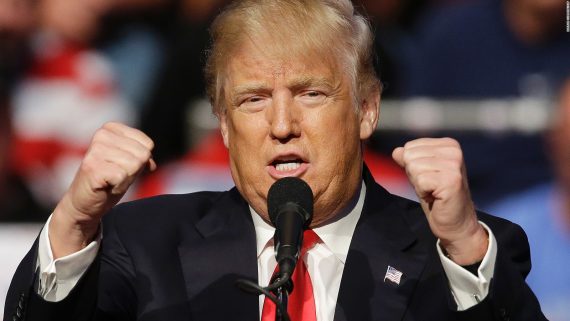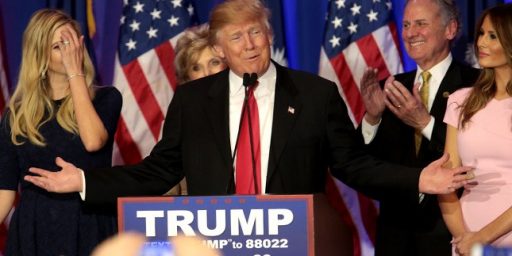Final Effort To Block Trump Fails In RNC Rules Committee
Predictably, the latest effort to prevent Donald Trump from gaining the Republican nomination has ended in failure.
The final effort of Republican stalwarts to prevent Donald Trump from gaining the Republican nomination on the first ballot next week has essentially failed with the failure of an effort in the RNC’s Rules Committee to adopt a rules change that would have unbound delegates even on the first ballot:
A key Republican National Convention committee crushed a long-shot attempt by rogue delegates to block Donald Trump’s nomination, as internal strife that’s roiled the party for much of the past decade was on full display Thursday amid fights over governing rules for the next four years.
The convention’s Rules Committee — convened exactly a week before Trump is expected to accept the party’s nomination — worked well into the evening Thursday as an air of distrust hovered over the 112-member panel.
While an attempt can still be made to try to unbind delegates from Trump, the committee voted overwhelmingly to reject a proposed amendment to allow delegates to vote their conscience and ignore the results of primaries and caucuses in their states. Kendal Unruh, a delegate from Colorado and a leader of the effort to stop Trump, offered the amendment.
“That is a God-given right,” Unruh said. “It should not be taken away by the RNC, by any party or by the state.”
Delegates defeated the amendment on a voice vote, but the vote to end debate on the measure was 77 to 21.
“It’s over folks,” Steve Scheffler, a delegate from Iowa, said during debate on a previous amendment dealing with binding delegates. “We need to get behind our candidate.”
Paul Manafort, Trump’s campaign chairman, celebrated the committee’s actions with a comment on Twitter. “Anti-Trump people get crushed at Rules Committee,” he wrote. “It was never in doubt: convention will honor will of people.”
(…)aeThe tensions played out even before the panel grapples with the question of whether a so-called minority report should be issued voicing opposition to Trump’s nomination. That quest appears likely to come to a head Monday when the report could be delivered on the first day of the full convention, if 28 votes for it can be secured from the committee.
Unless the full convention accepted the minority report, however, the delegates would remain bound. A bid to change the rules could always be initiated from the floor of the convention, but the hurdles for passage there are significantly higher.
The effort against Trump is being pushed by those within the party who view him as an unqualified candidate who has alienated women and minorities and could lead the party to devastating electoral defeat in November.
Much of Thursday’s combativeness came from delegates loyal to Senator Ted Cruz of Texas, who finished second in the primary campaign and may be trying to help shape the party’s rules in a way that could help him with a potential 2020 White House bid.
In the end, the outcome here was hardly surprising. Between the Trump supporters on the Rules Committee and the slots controlled by the Republican National Committee it seemed inevitable that this effort to effectively undo five months of primaries and caucuses and take from voters the authority that they believed they had when they walked into a voting booth or attended a caucus between February and June would fail. With only days to go before the convention, there are far too many people who have their time and in some cases money invested in the reality that Donald Trump will be the Republican nominee that changing it at the last minute simply was not going to succeed. Moreover, if the “Stop Trump” movement had somehow succeeded in its efforts to unbind the delegates, it’s entirely unclear what would have happened next. As far as anyone knew, there was no alternative candidate sitting out there ready to ride into Cleveland to accept the nomination of a party that would, at that point, be nearly fatally divided between Trump supporters and those who want anyone other than Trump to be the nominee but who have long suffered from the problem of not being able to rally behind an alternative candidate. As divisive as the Trump campaign is likely to be going forward both inside the Republican Party and on the national level, a move like this would have had just as bad an impact on the future of the GOP, and perhaps worse.
In reality, of course, the effort to stop Trump came to be too little, too late. When he first entered the race a year ago, he was largely viewed as a clown and the expectation was that his rise in the polls would be as temporary as similar events in past races involving candidates such as Michele Bachmann and Herman Cain. When it was apparent by September of last year that this was not the case, it seemed as though none of the candidates running against Trump, and none of the pundits who have spent the last several months lamenting the fact that Trump had captured the Republican Party, had any idea of what to do to stop him. More importantly, none of them really did anything to try to take Trump on directly. Jeb Bush didn’t really respond strongly to Trump’s attacks on him. Neither did Marco Rubio, Ben Carson, or Chris Chris Christie. There were occasional attacks on Trump, of course, but they mostly came in parting shots from candidates who dropped out of the race early such as Wisconsin Governor Scott Walker and former Texas Governor Rick Perry. The one candidate who would seem to have the most to gain by taking Trump down a peg, Senator Ted Cruz of Texas, spent much of the time before the primaries actually started cozying up to Trump rather than taking him on directly. As with the disbelief at the beginning of the race that Trump’s rise in the polls was for real, one suspects that much of this reluctance was attributable to the belief that Trump would not have the ground game necessary to turn support in the polls into votes. Once the primaries started and Trump started racking up win after win in the primaries, the GOP appeared to wake up to the threat that it faced, but by then it was too little, too late. Now, they’re just days away from Donald Trump officially accepting the Republican nomination and there’s really nothing they can do to stop it. As I’ve said before, this leaves Republicans with a choice, either they dutifully get in line behind Trump notwithstanding the fact that his rhetoric reveals him to be a demagogue who can’t be trusted with political power, or they find an alternative candidate to vote for on Election Day. The choice is theirs.






This was always going to fail. The Trump supporters may be a minority. But they are currently largest plurality in the GOP tent. And even those who don’t like him a) realize that reversing the primaries would cause huge problems; b) think he’s going to be a stooge for them to pass their own agenda.
The GOP, 2016: handed the ball for a penalty shot with no goalie; promptly kicked it into their own face.
If this group can convince enough Republicans to defect this year, then no, I wouldn’t say that.
I think that you’re confusing the tactics with the strategy. The effort to change the convention rules is just one of the battles for them to fight between now and November. They don’t have to win each battle, they just have to maintain the momentum of discontent in the hope that it influences the election result, i.e. getting Clinton into the White House without directly supporting her. Stop Trump translates into We’ll Tolerate Hillary.
According to CNN, as of 10. a.m. today, Trump made the v.p. offer to Pence, and Pence has accepted.
Trump confirmed Pence is VP choice in a tweet.
The dumbing down of America is complete.
Indeed, the Clinton campaign should send Trump a check after Hillary wins in November…
I love the mind set here. Instead of being a gracious winner, Trump and his people stomped and spit on the grave. Paybacks are generally hell.
@C. Clavin: He delayed the big, all network, announcement ’til media coverage settles down from Nice, then announces anyway in a Tweet? I though the kids took his phone away. I guess CNN had it anyway.
@gVOR08: And in doing so, he basically gave the first 24 hours to the oppo research dumps that are flying around.
Rolling out a VP is about the easiest aspect of a campaign and Trump managed to bungle it. When your chief campaign strategist tells the media that you cancelled because you were upset and overly emotional…
@gVOR08: @SKI:
I think Trump deferred his announcement not out of any regard for the dead of Nice, but because any announcement would have been buried by the awful news from France. Never underestimate Trump’s capacity for sleazy opportunism. This may be the most disgusting manifestation of it so far.
@Pch101:
I think that would be true if the GOP could win an election without support of so called independents or non-alligneds. As it is, neither party can and the GOP is the smaller of the two cohorts.
Republicans don’t accept that fact, but then, conservatives of the Rush Limbaugh variety also believe that they represent 60% or more of the electorate, too. So…
@Just ‘nutha ig’rant cracker:
If the Stop Trump folks can influence 1-2% of the voting pool in an otherwise close race, then that may be enough to clinch the result. (I don’t know if it will be a close race, but those who are playing to win must hedge in these situations.)
In this country, we elect candidates with majorities of electoral votes that can be achieved with pluralities of the popular vote. An election like this one could be won on the margins.
@Pch101: @Just ‘nutha ig’rant cracker: Keep in mind that the NeverTrumpers comprise at least two distinct groups. First, there are the establishment types–those who hail from the GOP’s business wing, as well as neocons. Many of them would prefer Hillary to Trump, whether they say so outright or not. Then there are the ideological right-wingers who feel Trump is a fake conservative. Many in this group favor Ted Cruz, whom the establishment types loathe. And they’re up to their neck in CDS; frankly, a lot of this second group are just as cuckoo as the Trumpsters themselves, just in different ways. We can’t say with any confidence that they’d prefer Hillary over Trump, though some of them have a kind of FU attitude toward the outcome of the election that’s sort of a right-wing version of the Naderites.
It’s hard to measure how widespread these groups actually are (it’s important not to confuse how vocal the pundits in these camps are with their actual numbers in the voting population), and there’s good reason to think they’ll diminish after the convention.
All that said, it is definitely true that even a seemingly tiny dropoff in support from Republican voters can have profound consequences. I like to do calculations using the Roper Center’s exit polling data, and I found this: In 2012, Romney won 93% of the GOP vote, which itself constituted 32% of the electorate. If he’d have won just 89% of the GOP vote, and that bloc had only constituted 30% of the electorate, and everything else in that election had stayed the same, Romney would have won less than 44% of the popular vote–less than even McCain got in 2008. So even seemingly minor shifts like this can matter, and that’s one reason why I’ve been skeptical of some of the sweeping statements I’ve seen that Republican voters will all dutifully get on board in the end. There’s never been any doubt in my mind that most of them will, but the minority that doesn’t shouldn’t be discounted.
@C. Clavin: Not only complete, but sealed with perhaps the worst campaign logo I have ever seen. Reinforces “TP” (one- or two-ply?) and is…mildly suggestive as well. Many of my design friends were convinced they were being punked with a fake logo.
@Jen:
TP ’16
Hehehe……
And by the way I think we ought to point out that the last time the delegates were bound in this manner, Reagan was rejected Ford got the nomination and lost in the general to Jimmy Carter. Those who do not learn from are doomed to repeat it
@Eric Florack: Do you think thatbRegan would have won?